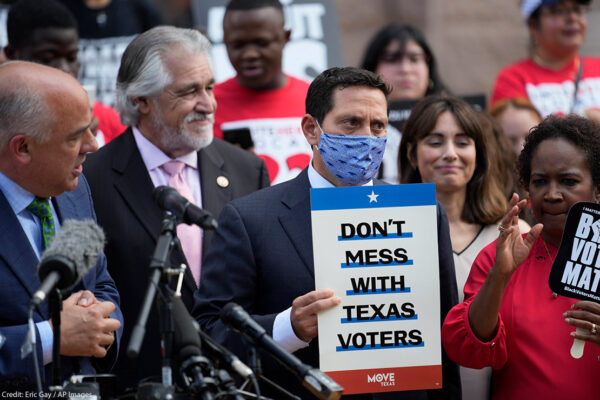Supreme Court Term 2024-2025
We’re breaking down the cases we've asked the court to consider this term.
Latest Case Updates
Ongoing
Updated July 29, 2025
Closed (Judgment)
Updated July 25, 2025
Closed (Judgment)
Updated July 24, 2025
Closed (Judgment)
Updated July 21, 2025
Featured
Louisiana
Aug 2025

Voting Rights
Nairne v. Landry
Nairne v. Landry poses a challenge under Section 2 of the Voting Rights Act of 1965 to Louisiana’s House and Senate legislative maps on behalf of plaintiff Black voters and Black voters across the state.
Washington, D.C.
Aug 2025

Voting Rights
League of Women Voters Education Fund v. Trump
On March 25, 2025, in a sweeping and unprecedented Executive Order, President Trump attempted to usurp the power to regulate federal elections from Congress and the States. Among other things, the Executive Order directs the Election Assistance Commission—an agency that Congress specifically established to be bipartisan and independent—to require voters to show a passport or other citizenship documentation in order to register to vote in federal elections. If implemented, the Executive Order would threaten the ability of millions of eligible Americans to register and vote and upend the administration of federal elections.
On behalf of leading voter registration organizations and advocacy organizations, the 51∆∑≤Ë and co-counsel filed a lawsuit to block the Executive Order as an unconstitutional power grab.
U.S. Supreme Court
Aug 2025

Voting Rights
Callais v. Landry
Whether the congressional map Louisiana adopted to cure a Voting Rights Act violation in Robinson v. Ardoin is itself unlawful as a gerrymander.
Ohio
Jul 2025

Reproductive Freedom
Planned Parenthood Southwest Ohio Region et al., v. Ohio Department of Health, et al.
The 51∆∑≤Ë, the 51∆∑≤Ë of Ohio, Planned Parenthood Federation of America, the law firm WilmerHale, and Fanon Rucker of the Cochran Law Firm, on behalf of Planned Parenthood Southwest Ohio Region, Planned Parenthood of Greater Ohio, Preterm-Cleveland, Women‚Äôs Med Group Professional Corporation, Dr. Sharon Liner, and Julia Quinn, MSN, BSN, amended a complaint in an existing lawsuit against a ban on telehealth medication abortion services to bring new claims under the Ohio Reproductive Freedom Amendment, including additional challenges to other laws in Ohio that restrict access to medication abortion in the state.
Georgia Supreme Court
Jun 2025

Voting Rights
Eternal Vigilance Action, Inc. v. Georgia
The 51∆∑≤Ë and partner organizations intervened in this case to represent the rights of voters and voting-rights organizations in a case challenging a number of rules passed by the Georgia State Election Board. We challenged the rule requiring that the number of votes cast be hand counted at the polling place prior to the tabulation of votes. In a critical victory for Georgia voters, in June 2025, the Georgia Supreme Court upheld a lower court‚Äôs decision permanently blocking the rule requiring hand counting of ballots at polling places before tabulation ‚Äî a process widely criticized for risking delays, ballot spoliation, and voter disenfranchisement.
U.S. Supreme Court
May 2025

Voting Rights
Racial Justice
Allen v. Milligan
Whether Alabama’s congressional districts violate Section 2 of the Voting Rights Act because they discriminate against Black voters. We succeeded in winning a new map for 2024 elections which, for the first time, has two congressional district that provide Black voters a fair opportunity to elect candidates of their choosing despite multiple attempts by Alabama to stop us at the Supreme Court. Despite this win, Alabama is still defending its discriminatory map, and a trial was held in February 2025 to determine the map for the rest of the decade.
In May 2025, a federal court ruled that Alabama's 2023 congressional map both violates Section 2 of the Voting Rights Act and was enacted by the Alabama Legislature with racially discriminatory intent.
South Carolina Supreme Court
Jan 2025

Voting Rights
League of Women Voters of South Carolina v. Alexander
This case involves a state constitutional challenge to South Carolina’s 2022 congressional redistricting plan, which legislators admit was drawn to entrench a 6-1 Republican majority in the state’s federal delegation. Plaintiff the League of Women Voters of South Carolina has asked the state’s Supreme Court to conclude that the congressional map is an unlawful partisan gerrymander that violates the state constitution.
Texas
Oct 2024

Voting Rights
OCA-Greater Houston v. Paxton
Texas has growing Hispanic and Black populations that helped propel record voter turnout in the November 2020 election. The Texas Legislature responded to this increased civic participation with an omnibus election bill titled Senate Bill 1—SB 1 for short—that targeted election practices that made voting more accessible to traditionally marginalized voters like voters of color, voters with disabilities, and voters with limited English proficiency. Since 2021, SB 1 has resulted in tens of thousands of lawful votes being rejected, and it remains a threat to democracy in Texas.
U.S. Supreme Court
Apr 2024

Reproductive Freedom
Idaho and Moyle, et al. v. United States
Idaho and Moyle, et al. v. United States was appealed to the U.S. Supreme Court by Idaho politicians seeking to disregard a federal statute — the Emergency Medical Treatment and Labor Act (EMTALA) — and put doctors in jail for providing pregnant patients necessary emergency medical care. The Supreme Court heard oral arguments on this case on April 24, 2024. The Court’s ultimate decision will impact access to this essential care across the country.
All Cases
1,600 Court Cases

Alabama Supreme Court
Aug 2025
Criminal Law Reform
Jennings v. Smith
This case asks whether Alabama law enforcement officers can demand physical ID when enforcing an Alabama that allows them to ‚ÄúStop and Question‚Äù people they reasonably suspect of criminal activity. Although the U.S. Court of Appeals for the Eleventh Circuit has already held that Alabama‚Äôs stop-and-question law does not authorize officers to demand physical ID, a federal district court in Alabama certified a question to the Alabama Supreme Court effectively asking the Court to reject that interpretation. The 51∆∑≤Ë‚Äôs State Supreme Court Initiative, along with the Cato Institute, the Southern Poverty Law Center, the Woods Foundation, and Kaplan Legal Services, filed an amicus brief urging the Alabama Supreme Court to agree with the Eleventh Circuit‚Äôs ruling. Our brief argues that the plain meaning of the stop-and-question law‚Äîgiven its title, its text, and the overall structure of the Alabama Code‚Äîrules out the possibility that it authorizes demands for physical documents. We also point out that interpreting the stop-and-question law to authorize document demands would render the law unconstitutional under both the U.S. and Alabama Constitutions.
Explore case
Alabama Supreme Court
Aug 2025

Criminal Law Reform
Jennings v. Smith
This case asks whether Alabama law enforcement officers can demand physical ID when enforcing an Alabama that allows them to ‚ÄúStop and Question‚Äù people they reasonably suspect of criminal activity. Although the U.S. Court of Appeals for the Eleventh Circuit has already held that Alabama‚Äôs stop-and-question law does not authorize officers to demand physical ID, a federal district court in Alabama certified a question to the Alabama Supreme Court effectively asking the Court to reject that interpretation. The 51∆∑≤Ë‚Äôs State Supreme Court Initiative, along with the Cato Institute, the Southern Poverty Law Center, the Woods Foundation, and Kaplan Legal Services, filed an amicus brief urging the Alabama Supreme Court to agree with the Eleventh Circuit‚Äôs ruling. Our brief argues that the plain meaning of the stop-and-question law‚Äîgiven its title, its text, and the overall structure of the Alabama Code‚Äîrules out the possibility that it authorizes demands for physical documents. We also point out that interpreting the stop-and-question law to authorize document demands would render the law unconstitutional under both the U.S. and Alabama Constitutions.

Nevada Supreme Court
Aug 2025
Capital Punishment
Ybarra v. Warden
This case presents the question of whether the execution of a capital defendant with serious mental illness violates Article I, section 6 of the Nevada Constitution, which prohibits cruel or unusual punishment. The 51∆∑≤Ë‚Äôs Capital Punishment Project and State Supreme Court Initiative, along with the 51∆∑≤Ë of Nevada, filed an amicus brief arguing that a plain reading of Article I, section 6 of the Nevada Constitution provides broader protections than the Eighth Amendment and should be interpreted to establish a categorical exemption from execution for this population.
Explore case
Nevada Supreme Court
Aug 2025

Capital Punishment
Ybarra v. Warden
This case presents the question of whether the execution of a capital defendant with serious mental illness violates Article I, section 6 of the Nevada Constitution, which prohibits cruel or unusual punishment. The 51∆∑≤Ë‚Äôs Capital Punishment Project and State Supreme Court Initiative, along with the 51∆∑≤Ë of Nevada, filed an amicus brief arguing that a plain reading of Article I, section 6 of the Nevada Constitution provides broader protections than the Eighth Amendment and should be interpreted to establish a categorical exemption from execution for this population.

New Hampshire
Aug 2025
Racial Justice
+2 Issues
National Education Association - New Hampshire v. Formella
Explore case
New Hampshire
Aug 2025

Racial Justice
+2 Issues
National Education Association - New Hampshire v. Formella

Court Case
Aug 2025
Capital Punishment
Immigrants' Rights
African Communities Together v. Lyons
Explore case
Court Case
Aug 2025

Capital Punishment
Immigrants' Rights
African Communities Together v. Lyons

Alaska
Jul 2025
Voting Rights
Racial Justice
Smith v. State of Alaska (Amicus)
The 51∆∑≤Ë and 51∆∑≤Ë of Alaska have filed an amicus in support of Tupe Smith, a woman born in American Samoa who now lives in Whittier, Alaska charged with falsely affirming that she was a U.S. citizen when she registered to vote. But Tupe Smith is not an ‚Äúalien‚Äù under the law. People, like her, born in the U.S. territory of American Samoa are the only remaining individuals recognized as ‚Äúnon-citizen U.S. nationals,‚Äù a unique status that falls short of ‚Äúcitizen‚Äù but nonetheless recognizes that American Samoa has been part of the United States for over 125 years.
All evidence indicates that Ms. Smith believed that, as a non-citizen U.S. national, she was eligible to vote in local elections when she registered to vote. In fact, local election officials encouraged her to check the box labeled "U.S. citizen" when she registered, given the fact that there was no option for "U.S. national."
Our amicus brief urges Alaska’s Court of Appeals to dismiss Tupe Smith’s indictment because of well-settled principles that election-crime statutes should be construed to avoid punishing innocent mistakes. Separately, we warn that upholding a different view of the law would make Alaska an outlier among the states.
Explore case
Alaska
Jul 2025

Voting Rights
Racial Justice
Smith v. State of Alaska (Amicus)
The 51∆∑≤Ë and 51∆∑≤Ë of Alaska have filed an amicus in support of Tupe Smith, a woman born in American Samoa who now lives in Whittier, Alaska charged with falsely affirming that she was a U.S. citizen when she registered to vote. But Tupe Smith is not an ‚Äúalien‚Äù under the law. People, like her, born in the U.S. territory of American Samoa are the only remaining individuals recognized as ‚Äúnon-citizen U.S. nationals,‚Äù a unique status that falls short of ‚Äúcitizen‚Äù but nonetheless recognizes that American Samoa has been part of the United States for over 125 years.
All evidence indicates that Ms. Smith believed that, as a non-citizen U.S. national, she was eligible to vote in local elections when she registered to vote. In fact, local election officials encouraged her to check the box labeled "U.S. citizen" when she registered, given the fact that there was no option for "U.S. national."
Our amicus brief urges Alaska’s Court of Appeals to dismiss Tupe Smith’s indictment because of well-settled principles that election-crime statutes should be construed to avoid punishing innocent mistakes. Separately, we warn that upholding a different view of the law would make Alaska an outlier among the states.
